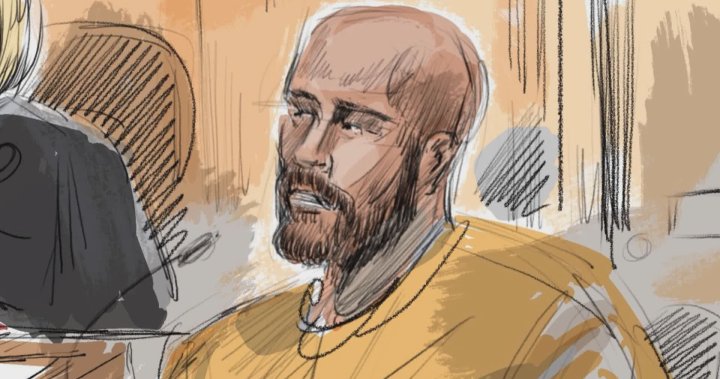The Tragic Case of the Henry Family: A Son Accused of Murder and Attempted Murder
A somber cloud hangs over the Toronto courtroom as 28-year-old Alpha Henry stands accused of the heinous crimes of murdering his parents, Veronica and Colin Henry, and attempting to murder his younger brother, Daniel Kwame Henry. The judge-alone trial, presided over by Superior Court Justice Joan Barrett, has culminated in a verdict that leaves the community reeling in disbelief. Justice Barrett, rejecting Alpha’s claims of his brother’s culpability, has found him responsible for the brutal stabbing deaths of his parents and the near-fatal attack on his brother. This verdict marks the beginning of a new chapter in the case, as the defense now intends to raise the issue of not criminally responsible (NCR) due to a mental disorder, a plea that the Crown vehemently opposes.
The chilling events unfolded in the early hours of September 21, 2022, when police responded to a distress call at a residential unit in Etobicoke. Inside, they discovered the lifeless bodies of Veronica and Colin Henry submerged in a bathtub, and Alpha Henry present at the scene. Daniel, the surviving brother, recounted a harrowing tale of returning home to find Alpha, who had been homeless, wielding a knife and uttering death threats before launching a vicious attack. Daniel managed to disarm his brother and flee the apartment, seeking refuge at a nearby gas station where he contacted emergency services.
The Crown, represented by Assistant Crown attorney Michael Wilson, presented a compelling narrative of premeditation and calculated malice. Wilson argued that Alpha had lured his brother back to the apartment using their deceased mother’s cellphone, crafting a sinister trap. The Crown’s timeline suggests that Alpha had murdered his parents sometime after September 19, subsequently using his mother’s phone not only to communicate with his brother but also to solicit sex services. The gruesome discovery of the bodies, doused in gasoline, indicated that the victims had been deceased for a significant period. The Crown further contended that Alpha, previously unable to access his parents’ building, had used his mother’s key fob to gain entry prior to the murders. Wilson posited that Alpha’s motive was to eliminate his brother and avoid accountability for his horrific crimes.
Alpha, however, maintained a consistent narrative of his brother’s guilt. He claimed that Daniel, upon returning home, became enraged at finding his parents engaged in prayer and subsequently attacked both Alpha and his parents before fleeing the scene with the murder weapon. Alpha’s defense attorney, Jamie Kopman, challenged the Crown’s timeline, emphasizing the forensic pathologist’s inability to pinpoint the exact time of death beyond a period between Veronica’s last known contact and the discovery of the bodies. Kopman argued that the presence of a knife found on Daniel, coupled with the lack of conclusive evidence regarding Alpha’s involvement in cleaning the scene and awaiting his brother’s return, cast reasonable doubt on Alpha’s culpability.
The defense’s decision to raise the issue of NCR introduces a complex layer to the legal proceedings. While not entirely unexpected by the Crown, the NCR plea will require a thorough assessment of Alpha’s mental state at the time of the alleged crimes. This assessment will delve into the potential presence of a mental disorder that could have impaired his ability to understand the nature and consequences of his actions or to appreciate the wrongfulness of his conduct. The Crown’s opposition to the NCR assessment signals a protracted legal battle, as both sides prepare to present their arguments regarding Alpha’s mental capacity during the commission of the alleged offenses.
The upcoming court date, scheduled for January 17, will focus on the defense’s request for an NCR assessment. This hearing will be pivotal in determining the trajectory of the case. Should the court order an assessment, a team of mental health professionals will evaluate Alpha’s mental state, and their findings will significantly impact the final outcome of the trial. The Crown’s resistance to the NCR assessment underlines the gravity of the charges and the potential consequences for Alpha. If found guilty, he faces a lengthy prison sentence. If deemed NCR, he would be subject to a different legal process, potentially involving treatment and supervision within the mental health system.
The Henry family tragedy stands as a stark reminder of the fragility of life and the devastating consequences of violence. The court’s decision regarding the NCR assessment will be a critical juncture in this complex case, shaping the future for Alpha Henry and bringing a measure of closure to the grieving community grappling with this senseless loss. As the legal proceedings continue, the pursuit of justice and the search for truth remain paramount. The court’s ultimate decision will not only determine Alpha’s fate but also provide a crucial framework for understanding the motivations behind these horrific acts and addressing the underlying issues that contribute to such tragedies.

